Key takeaways:
- The breakdancing community thrives on creativity, mentorship, and support, fostering a sense of belonging among dancers of all skill levels.
- Mentorship plays a transformative role, helping dancers develop skills, confidence, and a deeper understanding of their personal and artistic journeys.
- Key lessons from mentors include patience, personal expression, and the strength found in vulnerability, which enhance connections within the community.
- Practical skills like improvisation, self-reflection, and incorporating diverse styles enrich personal practice and promote continuous growth in dance.
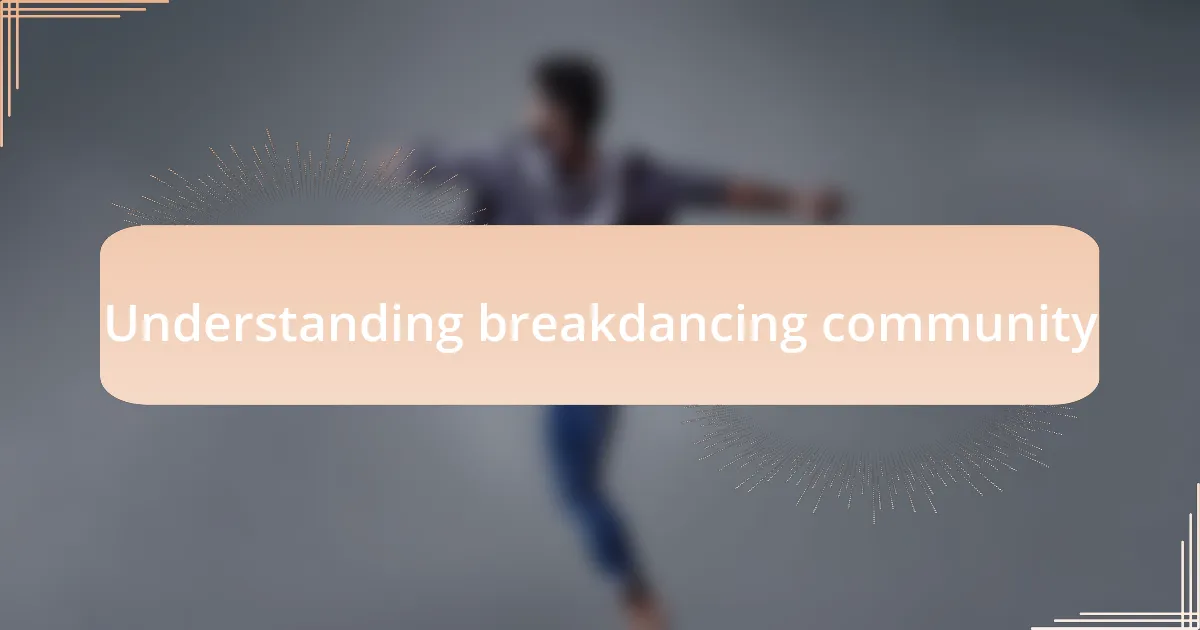
Understanding breakdancing community
The breakdancing community is a vibrant and diverse world that thrives on creativity, expression, and camaraderie. I remember stepping into my first cypher, where the energy felt electric. Surrounded by dancers from various backgrounds, I was struck by how everyone, regardless of skill level, was there to uplift each other. Isn’t that a beautiful aspect of this culture?
Each battle or jam I attended revealed a tapestry of stories and experiences, woven together by the common thread of hip-hop. It’s not just about the moves; it’s about the sense of belonging. I often found myself cheering for dancers whose styles were completely different from mine. This support fosters an environment where art flourishes, and individual journeys are celebrated.
Moreover, the sense of mentorship plays a crucial role in this community. I recall a seasoned B-boy taking the time to break down a complex footwork move for me. That experience didn’t just improve my technique; it deepened my appreciation for the culture as a whole. How often do we engage in spaces where mentorship flows so freely? The breakdancing community thrives on sharing knowledge, making it a nurturing ground for both new and seasoned dancers alike.
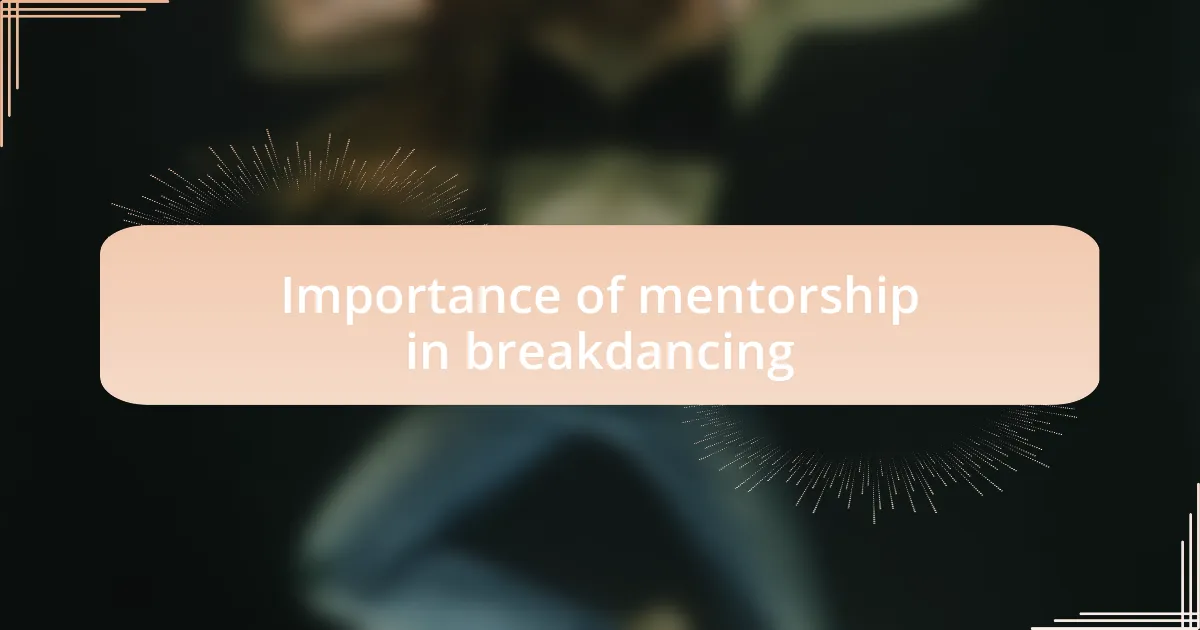
Importance of mentorship in breakdancing
Mentorship in breakdancing isn’t just beneficial; it’s transformative. I remember when I first connected with a mentor who had decades of experience. He shared not only his technical skills but also the philosophy behind the moves. This deepened my understanding of why I dance and helped me develop my own style, far beyond mere imitation.
What truly strikes me is how mentorship fosters a sense of responsibility within the community. When I started to gain confidence, I felt compelled to give back. Guiding a newcomer through their first windmill, I found joy in witnessing their excitement and growth. It’s a cycle that rejuvenates the community, creating a bridge between generations.
Additionally, having a mentor can significantly enhance a dancer’s journey, helping them navigate the highs and lows of competition and performance. I often thought, “What if I hadn’t had that guiding hand?” Without mentorship, many talented individuals might lose the motivation or direction they need. In a culture that celebrates self-expression, having someone to guide you can make all the difference.
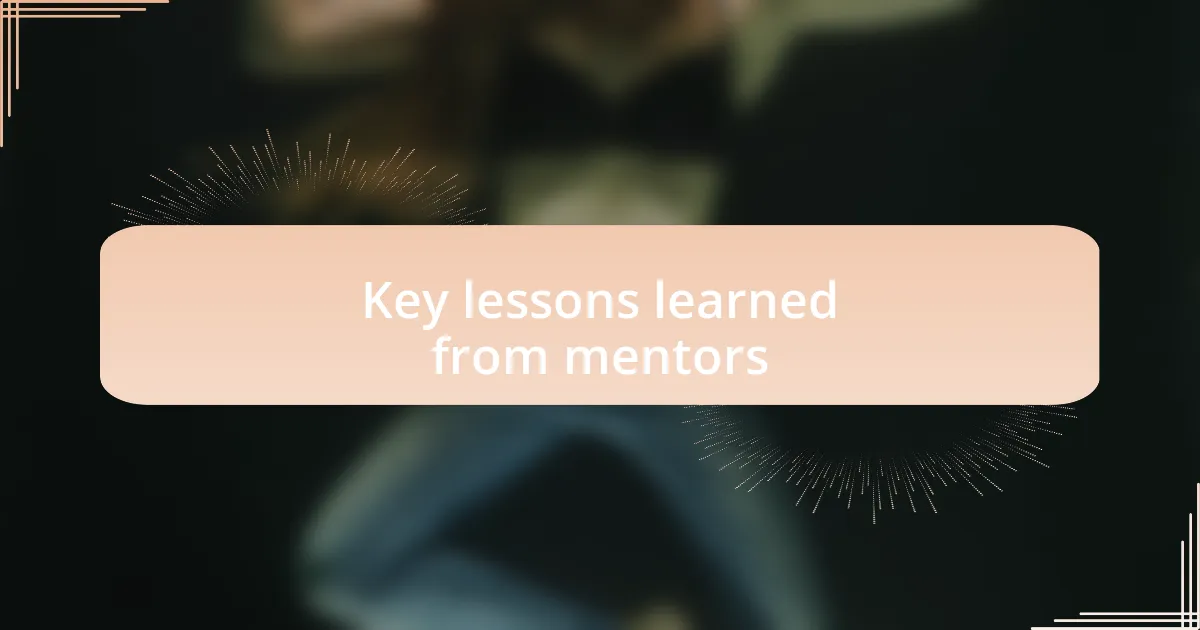
Key lessons learned from mentors
One key lesson from my mentors has been the importance of patience. I vividly recall a time when I was frustrated after countless attempts to nail a freeze. My mentor calmly reminded me that mastery takes time and effort. He often said, “Great things don’t come easy.” This perspective shifted my focus from immediate results to the joy of the learning journey itself.
Another lesson that stands out is the significance of personal expression. I watched my mentor infuse his unique personality into every performance. I used to think that breaking was just about the moves, but he taught me that it’s really about conveying emotion. When I finally embraced my individuality, I felt an exhilarating sense of freedom on the dance floor.
Lastly, one important takeaway I gained was the strength of vulnerability. My mentors shared their struggles openly, often recounting battles with self-doubt and injuries. It encouraged me to share my own fears and insecurities, realizing I wasn’t alone in my journey. Isn’t it powerful to know we all face challenges? Understanding that vulnerability is part of growth has created deeper connections within my dance community.
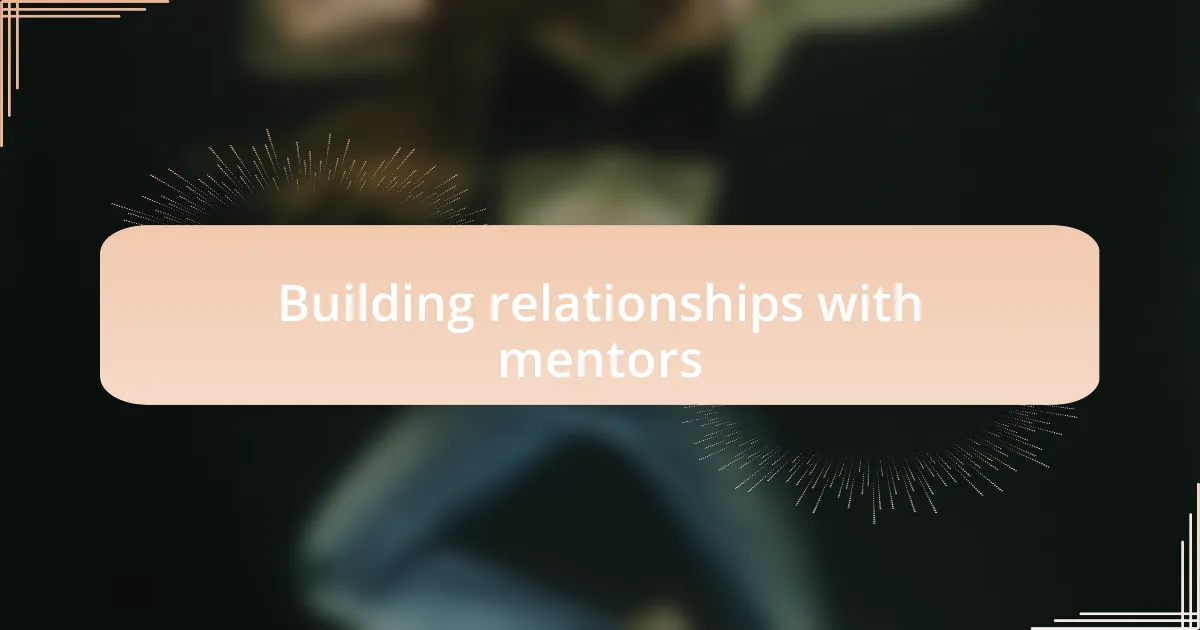
Building relationships with mentors
Building relationships with mentors is one of the most gratifying experiences I’ve had in breakdancing. I remember reaching out to a local B-Boy who had always inspired me, only to find that he was welcoming and eager to share his journey. It was in those informal chats over coffee that I understood mentorship isn’t just about technical skills but about building a bond of trust and respect. Don’t you think that having someone who believes in you can ignite a spark of motivation?
As I navigated through my own dancing challenges, I found that consistent communication with my mentors was key. I began setting aside time for regular check-ins to discuss my progress and seek feedback. This routine not only provided me with critical insights into my technique but also deepened our connection. Have you ever noticed how sharing struggles creates a sense of camaraderie? It’s like we’re all in this dance together, journeying toward improvement side by side.
Moreover, I learned that mentorship is as much about listening as it is about receiving advice. There was a moment when my mentor asked for my opinion on a routine he was crafting. That simple act of inclusion made me feel valued and showcased that guidance can be a two-way street. It’s empowering to realize that mentors can learn from their mentees, fostering an environment where everyone evolves. How often do we create space for this mutual growth in our relationships?
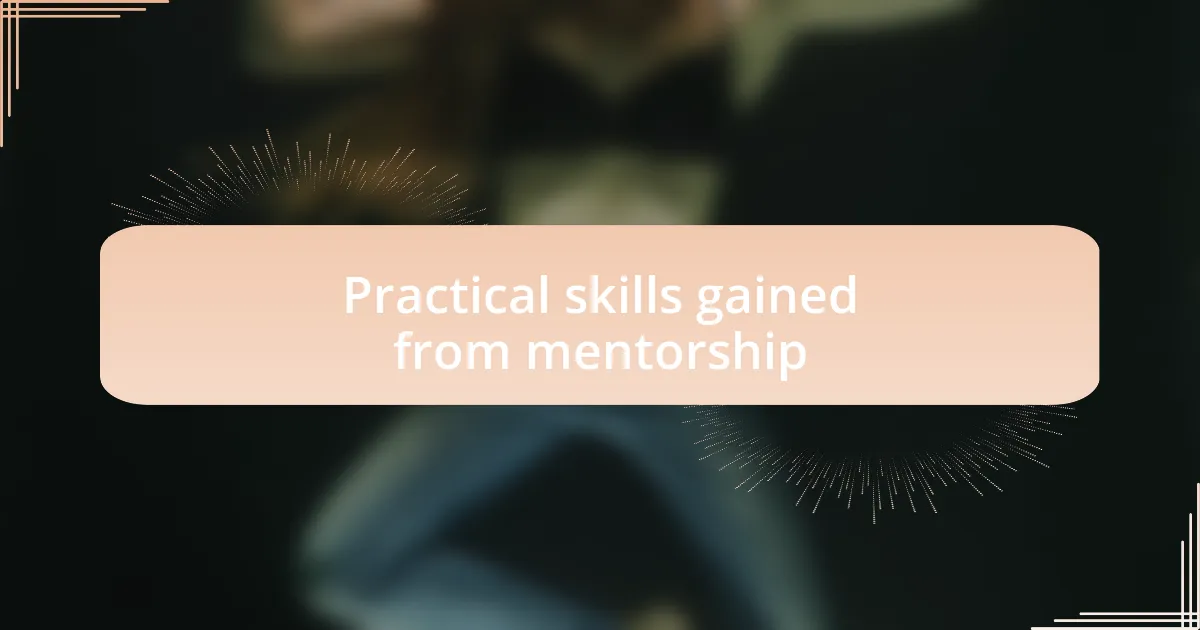
Practical skills gained from mentorship
One of the most practical skills I gained from my mentors was the art of improvisation. During a pivotal session, a mentor encouraged me to create on the spot, pushing me to step out of my comfort zone. I vividly recall the thrill and anxiety of performing without a set routine, but it taught me to be adaptable and responsive in my dance. Have you ever felt that rush of creativity when you let go and just flow?
Another significant skill was learning how to critique myself constructively. My mentor introduced me to the concept of self-reflection, urging me to record my practices and dissect them afterward. I remember watching myself struggle with a move, but instead of frustration, I found clarity in understanding where to improve. Isn’t it fascinating how seeing ourselves from a different perspective can unveil new paths for growth?
Finally, mentorship helped me embrace unique styles and techniques from various B-Boys. I had an instance where my mentor highlighted the elements of a rival dancer’s style that I had overlooked. Trying out those moves not only broadened my repertoire but also added depth to my own choreography. How often do we limit ourselves by sticking to what we know? Breaking free from that comfort zone can lead to extraordinary new heights.
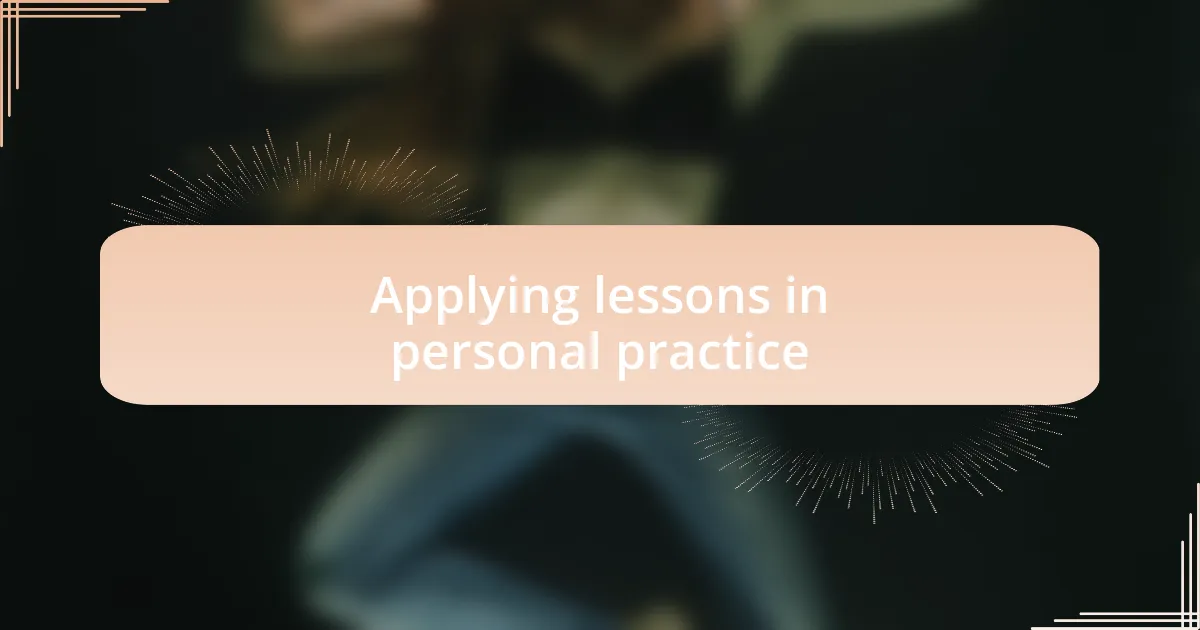
Applying lessons in personal practice
In my personal practice, I’ve started to savor the lessons of improvisation more deeply. After that eye-opening session with my mentor, I began to integrate spontaneous movements into my daily training. I still remember my first attempt at this—I felt a mix of excitement and apprehension. But as the flow took over, I found myself making connections with the music that I had never experienced before. Have you been surprised at what emerges when you simply let go?
Self-reflection has become a cornerstone of my practice, drastically shifting how I approach each session. There was a moment when I edited a video of my dance and noticed subtle mistakes that I had previously ignored. Watching that footage became a revelation, almost like seeing a hidden layer of strength within me. I realized that each flaw was an opportunity for a breakthrough. Isn’t it amazing how stepping back can sometimes give us a clearer focus?
Incorporating diverse styles has been an exhilarating journey. One day, I decided to experiment with a unique freeze I’d observed and hadn’t thought I could pull off. Each attempt came with its own set of challenges, yet I discovered new ways to express myself. It felt like adding color to a black-and-white canvas. How often do we shy away from trying something that initially feels out of reach? Embracing these different techniques not only enhanced my versatility but also ignited a newfound passion for exploration in my dance.